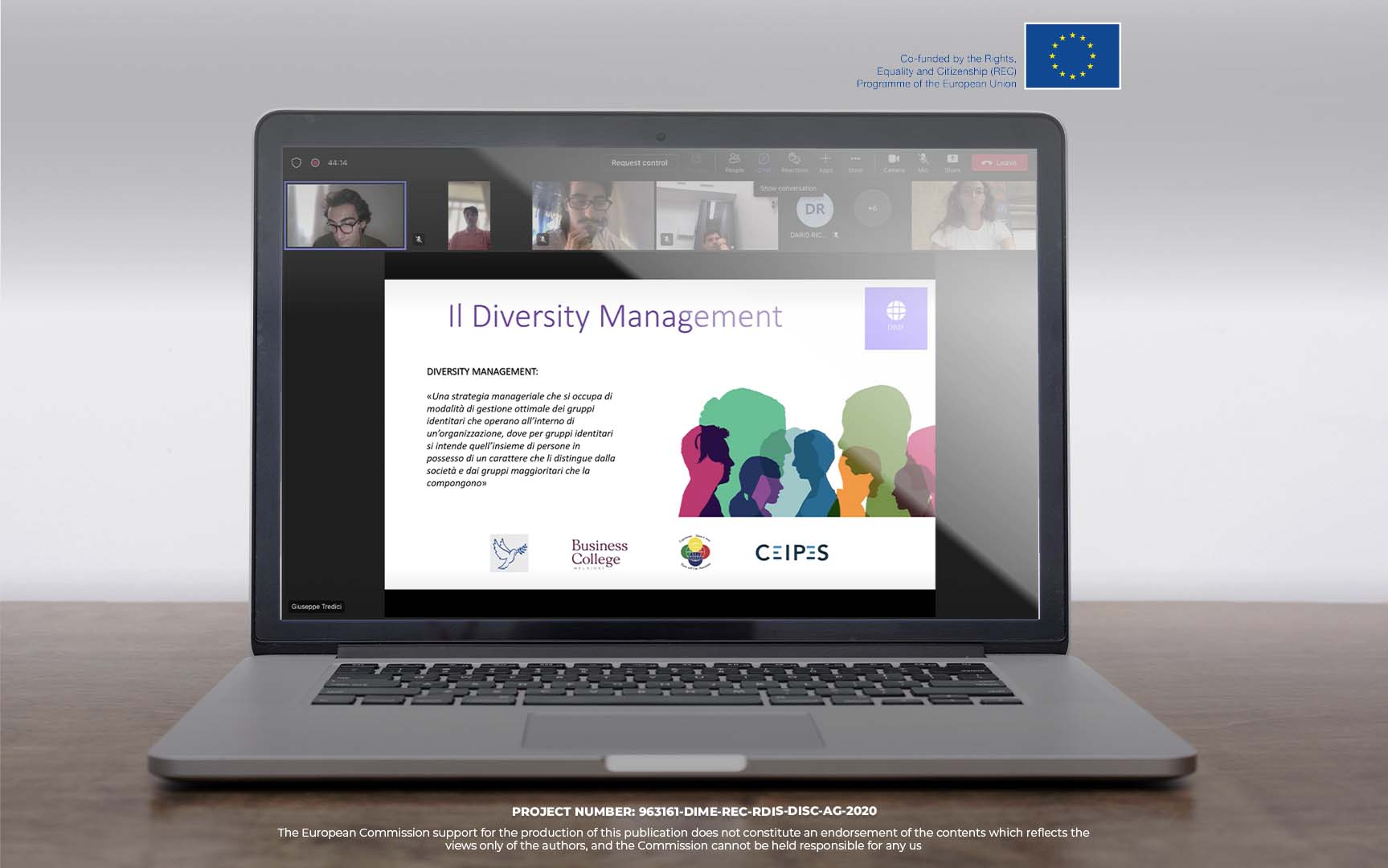DIME – The online pilot of the project to test the e-learning platform for SMEs and NGOs
The pilot event of the project DIME, “Diversity Management and Inclusive Employment for Ethnic minorities and migrants in SMEs and NGOs” (963161), recently begun online on the 22th of September (this option was selected to allow participants from other regions to take part in the event). DIME was developed by a Consortium of four partners from different countries: K&C – SDRUDZENIE ZNAM I MOGA (Bulgaria); BCH – HELSINKI BUSINESS COLLEGE (Finland); MIR AKADEMIEN AB (Sweden) and CEIPES (Italy).
Project DIME aims at raising awareness of discrimination in the labour market based on ethnicity trying to show best practices under the label of Diversity Management and at developing innovative learning methods and tool to implement inclusion strategies in working environments.
For this reason, the foretold pilot event was about the testing of one special product the consortium created: an e-learning platform that can support both SMEs and NGOs in developing and implementing diversity management strategies.
At the beginning of the event each participant had the occasion to introduce themselves and to talk about their organisations. They were also given some insight into the project by showing its milestones and what we achieved so far.
The testing of the pilot was structured so that each of the five modules of the platform could be properly explored and tested. Indeed, for every step in each module, both toolkits and further literature analysis were shown to make sure that participants could reach the desired level of knowledge for all the topics. Also, we practiced one exercise for each module.
For Module 1, dealing with the field of the intercultural skills required to carry out diversity management strategies, all participants were trained about these type of skill, the intercultural communication rules, and the notion of organisational culture. To let the new information sink in, all participants took part in an exercise requiring them to pick up some values among those listed in the platform and explain their decisions.
Module 2 will support the target group when collecting information, before the design of the diversity management plan. This was done by identifying benefits that come with these strategies, setting indicators to monitor the process and mapping possible and future obstacles and challenges. For this Module, we developed an exercise for which participants had to associate some benefits to a specific sphere or field, coming from the application of the diversity management.
Module 3, was about the real development of the diversity management strategy for the organisations. It consists of three different steps: analysing (current situation and preconditions for diversity management to happen), development of the diversity management plan (step by step, individuating roles and deadlines) and raising awareness (design of the communication strategy). For this module we chose an exercise form Step 2. It required for participants to individuate a risk/objective in applying diversity management actions and think of possible solution, monitoring indicators, responsibility and deadline.
Module 4, supported the real implementation of the strategy designed in the previous module. Indeed, we began with a strong consideration of the recruitment process to be able to attract different types of candidates. Following with solution to differentiate teams and raise the difference of culture within them. Next steps were about setting generically inclusive working conditions in the fields of parental leaves, breaks, retribution, and involvement of all employees. For this module, we planned the exercises in second Step, to make participant discuss some best practice to reduce bias in recruitment and asked if they had knowledge of some more than the ones listed in the platform.
At last, in Module 5, we showed how to properly set the follow-up process through two Steps:
- Ensure a lifelong training on the topics and getting feedback from employees.
- Setting new goals for diversity management.
Participants evaluated their knowledge and activities both before and after the pilot event, to give us a proper measure of the learning they developed through our activities. We can fortunately state that all participants were satisfied by the testing of the platform and said that it helped them in the real understanding of how to introduce diversity management in organisations.
